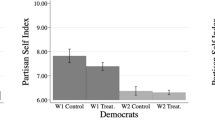Abstract
The aim of this article is to provide a short summary of the study that obtained the ITAX Ph.D. Award in 2017 (Kishishita, in: Emergence of populism under risk and ambiguity, 2017. https://ssrn.com/abstract=3006550). This study is a game-theoretic analysis of populism using a dynamic elections model with information asymmetries. The main focus is the effect of uncertainty voters face about an elite’s degree of bias on the emergence of populism. Interestingly, its effect is different depending on the source of the uncertainty. In particular, an increase in risk and that in ambiguity (Knightian uncertainty) work in the opposite directions with higher ambiguity rather than risk being a significant source of populism.
Similar content being viewed by others
References
Acemoglu, D., Egorov, G., & Sonin, K. (2013). A political theory of populism. The Quarterly Journal of Economics, 128(2), 771–805.
Berliant, M., & Konishi, H. (2005). Salience: Agenda choices by competing candidates. Public Choice, 125(1–2), 129–149.
Duggan, J. (2000). Repeated elections with asymmetric information. Economics and Politics, 12(2), 109–135.
Ellis, A. (2016). Condorcet meets ellsberg. Theoretical Economics, 11(3), 865–895.
Ghirardato, P., & Katz, J. N. (2006). Indecision theory: Weight of evidence and voting behavior. Journal of Public Economic Theory, 8(3), 379–399.
Gilboa, I., & Schmeidler, D. (1989). Maxmin expected utility with non-unique prior. Journal of Mathematical Economics, 18(2), 141–153.
Kishishita, D. (2017). Emergence of populism under risk and ambiguity. https://ssrn.com/abstract=3006550. Accessed 14 Oct 2018.
Mudde, C. (2004). The populist zeitgeist. Government and Opposition, 39(4), 542–563.
Schmeidler, D. (1989). Subjective probability and expected utility without additivity. Econometrica, 57(3), 571–87.
Acknowledgements
I am grateful to Ronald B. Davies, Kimberley Scharf, and Sara LaLumia (the editors-in-chief) for their helpful comments.
Author information
Authors and Affiliations
Corresponding author
Rights and permissions
About this article
Cite this article
Kishishita, D. Emergence of populism under ambiguity. Int Tax Public Finance 25, 1559–1562 (2018). https://doi.org/10.1007/s10797-018-9519-y
Published:
Issue Date:
DOI: https://doi.org/10.1007/s10797-018-9519-y




